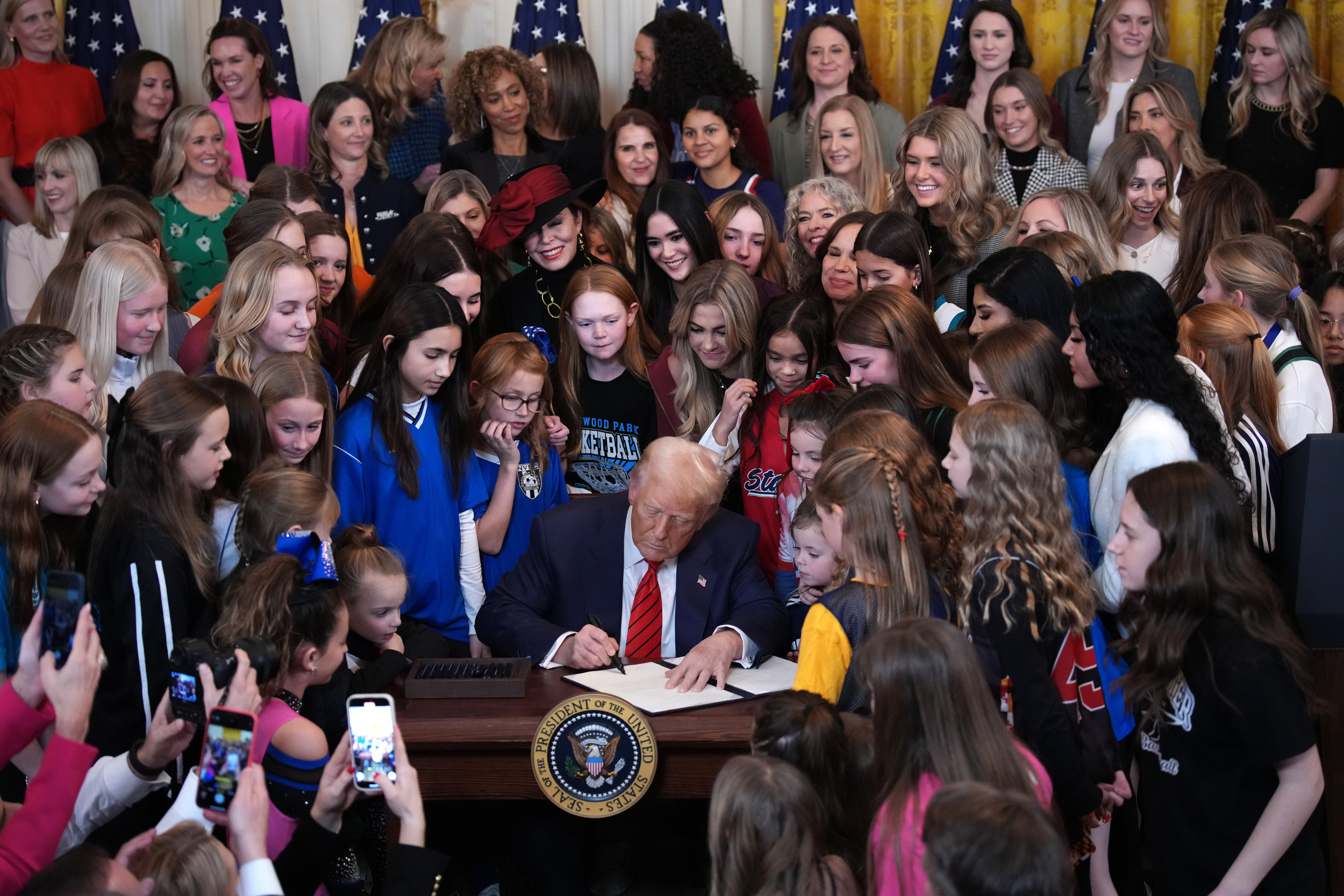The National Collegiate Athletic Association (NCAA) has updated its participation policy for transgender athletes, limiting competition in women's sports to individuals assigned female at birth.
The new policy takes effect immediately and applies to all NCAA athletes, regardless of prior eligibility under the previous transgender participation rules.
Why It Matters
The decision follows an executive order signed by President Donald Trump just a day earlier, aiming to bar transgender athletes from competing in girls' and women's sports.
The order allows federal agencies to withhold funding from organizations that do not comply with Title IX as interpreted by the Trump administration, which defines "sex" as the gender assigned at birth.
The inclusion of transgender athletes in women's sports has faced increasing criticism from conservative groups, who argue it creates an unfair competitive advantage and raises safety concerns. The issue has become a central talking point in Trump's reelection campaign, despite transgender athletes making up a small minority in college sports.
What To Know
The policy change, effective immediately, applies to all NCAA athletes regardless of prior eligibility reviews. The NCAA, which oversees more than 500,000 athletes across 1,100 member schools, is the largest governing body for college sports in the U.S.
As of last year, the NCAA had identified only 10 transgender athletes competing at the collegiate level.
"We strongly believe that clear, consistent, and uniform eligibility standards would best serve today's student-athletes instead of a patchwork of conflicting state laws and court decisions," NCAA President Charlie Baker said. "To that end, President Trump's order provides a clear, national standard."

The previous NCAA policy, enacted in 2022, took a sport-by-sport approach, deferring to national and international governing bodies to determine eligibility for transgender athletes. If no such policy existed, the NCAA followed the International Olympic Committee's criteria.
Under the new policy, athletes assigned male at birth may practice with women's teams and receive benefits such as medical care. Women's basketball teams, for example, often practice against male students. However, athletes assigned female at birth who have started hormone therapy, such as testosterone, may practice with women's teams but cannot compete without jeopardizing the team's eligibility for championships.
Regardless of gender identity or sex, an athlete may practice and compete with a men's team if they meet all other NCAA eligibility requirements. Member schools remain responsible for certifying athlete eligibility for practice and competition, but local, state, and federal laws take precedence over NCAA rules.
Two Lawsuits
The NCAA's decision came hours after the Trump administration announced investigations into potential civil rights violations at two universities and a high school sports league that allowed transgender athletes to compete in women's sports. The Education Department has opened reviews into San Jose State University, the University of Pennsylvania, and the Massachusetts Interscholastic Athletic Association.
San Jose State's women's volleyball team made headlines last season over unconfirmed allegations that it had a transgender player on its roster. At Penn, three former teammates of transgender swimmer Lia Thomas have sued the NCAA, the Ivy League, Harvard, and the university, arguing that Thomas's participation in conference and national championships violated Title IX.

What People Are Saying
Trump posted on Truth Social on Thursday: "Exciting news! Due to my Executive Order, which I proudly signed yesterday, the NCAA has officially changed their policy of allowing men in Women's Sports – IT IS NOW BANNED! This is a great day for women and girls across our Country. Men should have NEVER been allowed to compete against women in the first place, but I am proud to be the President to SAVE Women's Sports. We expect the Olympics Committee to also use Common Sense, and implement this policy, which is very popular among the American People, and the entire World!"
President Donald Trump, at Wednesday's executive order signing ceremony: "With this executive order, the war on women's sports is over."
Transgender actress and activist Laverne Cox told CNN: "Executive orders limiting our rights, 26 states banning gender-affirming care for young people, banning us from the military, from bathrooms...there's this whole anti-trans thing, and we're less than 1 percent of the population."
NCAA President Charlie Baker, on Thursday: "We strongly believe that clear, consistent, and uniform eligibility standards best serve today's student-athletes instead of a patchwork of conflicting state laws and court decisions."
What Happens Next
The NCAA emphasized that its Board of Governors has directed staff to support member schools in fostering respectful and inclusive athletic environments. It also recently updated its mental health guidance.
"This national standard brings much-needed clarity as we modernize college sports for today's student-athletes," Baker said.
The revised NCAA policy now aligns with the National Association of Intercollegiate Athletics, which governs sports at 241 mostly small colleges. Last April, the NAIA unanimously approved a policy restricting competition in women's sports to athletes assigned female at birth who have not undergone hormone therapy.
This article includes reporting from The Associated Press.
Update 2/6/25, 4:14 p.m. ET: This article was updated with additional information.
Update 2/6/25, 5:24 p.m. ET: This article was updated with additional information.
Update 2/6/25, 6 p.m. ET: This article was updated with additional information.
fairness meter
About the writer
Gabe Whisnant is Deputy Weekend Editor at Newsweek based in South Carolina. Prior to joining Newsweek in 2023, he directed ... Read more



